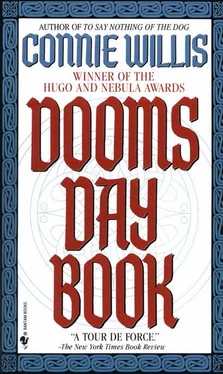She had certainly thought of everything else, even down to her fingernails. When she had come in to show him her costume, she had held up her hands. Her nails had been broken off, and there were traces of dirt in the cuticles. “I know I’m supposed to be nobility, but rural nobility, and they did a lot of farm chores in between Bayeaux Tapestries, and East Riding ladies didn’t have scissors till the 1600’s, so I spent Sunday afternoon in Montoya’s dig, grubbing among the dead bodies, to get this effect.” There was obviously no reason to worry about a minor detail like snow.
But he couldn’t help it. If he could speak to Badri, ask him what he’d meant when he said, “Something wrong,” make certain the drop had gone properly and that there hadn’t been too much slippage, he might be able to stop worrying. But Mary had not been able even to get Badri’s NHS number till Finch phoned with it. He wondered if he were still unconscious. Or worse.
He got up and went over to the tea trolley and made himself a cup of tea. Gilchrist was on the phone again, apparently speaking to the porter. The porter didn’t know where Basingame was either. When Dunworthy had talked to him, he had told him he thought Basingame had mentioned Loch Balkillan, a lake that turned out not to exist.
Dunworthy drank his tea. Gilchrist rang up the bursar and the deputy warden, neither of whom knew where Basingame had gone. The nurse who had guarded the door earlier came in and finished the blood tests. The male medic picked up one of the inspirational brochures and began to read it.
Montoya filled out her admissions form and her lists of contacts. “What am I supposed to do?” she asked Dunworthy. “Write down the people I’ve been in contact with today?”
“The past three days,” he said.
They continued to wait. Dunworthy drank another cup of tea. Montoya rang up the NHS and tried to persuade them to give her a quarantine exemption so she could go back to the dig. The female medic went back to sleep.
The nurse wheeled in a trolley with supper on it. “‘ Greet chere made our hoste us everichon, And to the soper sette us anon ,’” Latimer said, the only remark he had made all afternoon.
While they ate, Gilchrist regaled Latimer with his plans for sending Kivrin to the aftermath of the Black Death. “The accepted historical view is that it completely destroyed mediaeval society,” he told Latimer as he cut his roast beef, “but my research indicates it was purgative rather than catastrophic.”
From whose point of view? Dunworthy thought, wondering what was taking so long. He wondered if they were truly processing the blood tests or if they were simply waiting for one or all of them to collapse across the tea trolley so they could get a fix on the incubation period.
Gilchrist rang up New College again and asked for Basingame’s secretary.
“She’s not there,” Dunworthy said. “She’s in Devonshire with her daughter for Christmas.”
Gilchrist ignored him. “Yes. I need to get a message through to her. I’m trying to reach Mr. Basingame. It’s an emergency. We’ve just sent an historian to the 1300’s, and Balliol failed to properly screen the tech who ran the net. As a result, he’s contracted a contagious virus.” He put the phone down. “If Mr. Chaudhuri failed to have any of the necessary antivirals, I’m holding you personally responsible, Mr. Dunworthy.”
“He had the full course in September,” Dunworthy said.
“Have you proof of that?” Gilchrist said.
“Did it come through?” the medic asked.
They all, even Latimer, turned to look at her in surprise. Until she’d spoken, she’d seemed fast asleep, her head far forward on her chest and her arms folded, holding the contacts lists.
“You said you sent somebody back to the Middle Ages,” she said belligerently. “Did it?”
“I’m afraid I don’t—” Gilchrist said.
“This virus,” she said. “Could it have come through the time machine?”
Gilchrist looked nervously at Dunworthy. “That isn’t possible, is it?”
“No,” Dunworthy said. It was obvious Gilchrist knew nothing about the continuum paradoxes or string theory. The man had no business being Acting Head. He didn’t even know how the net he had so blithely sent Kivrin through worked. “The virus couldn’t have come through the net.”
“Dr. Ahrens said the Indian was the only case,” the medic said. “And you said,” she pointed at Dunworthy, “that he’d had the full course. If he’s had his antivirals, he couldn’t catch a virus unless it was a disease from somewhere else. And the Middle Ages was full of diseases, wasn’t it? Smallpox and the plague?”
Gilchrist said, “I’m certain that Mediaeval has taken steps to protect against that possibility—”
“There is no possibility of a virus coming through the net,” Dunworthy said angrily. “The space-time continuum does not allow it to happen.”
“You send people through,” she persisted, “and a virus is smaller than a person.”
Dunworthy hadn’t heard that argument since the early years of the nets, when the theory was only partially understood.
“I assure you we’ve taken every precaution,” Gilchrist said.
“Nothing that would affect the course of history can go through a net,” Dunworthy explained, glaring at Gilchrist. The man was simply encouraging her with this talk of precautions and probabilities. “Radiation, toxins, microbes, none of them has ever passed through a net. If they’re present the net simply won’t open.”
The medic looked unconvinced.
“I assure you—” Gilchrist said, and Mary came in.
She was carrying a sheaf of variously-colored papers. Gilchrist stood up immediately. “Dr. Ahrens, is there a possibility that this viral infection Mr. Chaudhuri has contracted might have come through the net?”
“Of course not,” she said, frowning as if the whole idea were ridiculous. “In the first place, diseases can’t come through the net. It would violate the paradoxes. In the second place, if it had, which it can’t , Badri would have caught it less than an hour after it came through, which would mean the virus had an incubation period of an hour, an utter impossibility. But if it did, which it can’t , you all would be down ill already,” she looked at her digital, “since it’s been over three hours since you were exposed to it.” She began collecting the contacts lists.
Gilchrist looked irritated. “As Acting Head of the History Faculty I have responsibilities I must attend to,” he said. “How long do you intend to keep us here?”
“Only long enough to collect your contacts lists,” she said. “And to give you your instructions. Perhaps five minutes.”
She took Latimer’s list from him. Montoya grabbed hers up from the end table and began writing hastily.
“Five minutes?” the medic who had asked about the virus coming through the net said. “Do you mean we’re free to go?”
“On medical probation,” she said. She put the lists at the bottom of her sheaf of papers and began passing the top sheets, which were a virulent pink, around to everyone. They appeared to be a release form of some sort, absolving the infirmary of any and all responsibility.
“We’ve completed your blood tests,” she went on, “and none of them show an increased level of antibodies.”
She handed Dunworthy a blue sheet which absolved the NHS of any and all responsibility and confirmed willingness to pay any and all charges not covered by the NHS in full and within thirty days.
“I’ve been in touch with the WIC, and their recommendation is controlled observation, with continuous febrile monitoring and blood samples at twelve-hour intervals.”
Читать дальше












